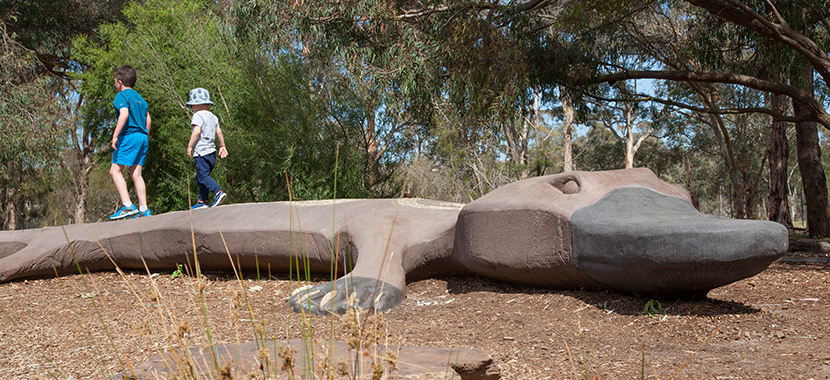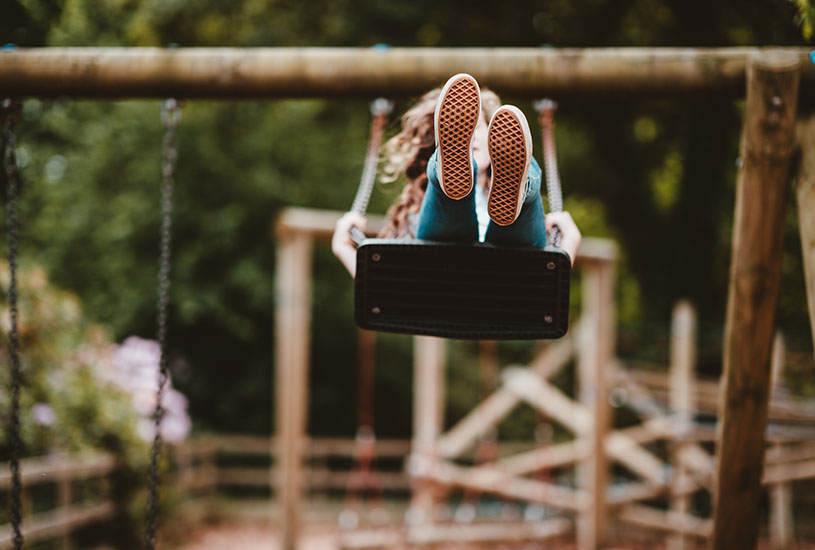An innovative play-scape in a local park that focusses on ‘real world’ experiences has substantially increased physical activity at the park.
Deakin University researchers have shown that playgrounds designed to encourage children to connect with the natural environment, such as mazes, nature play areas, climbing equipment and sculptures, can significantly improve physical activity levels.
Lead researcher, Dr Jenny Veitch, from Deakin’s Institute for Physical Activity and Nutrition (IPAN), said, despite considerable investment in park renovations, few studies have examined the impact of improving park amenities on people’s physical activity and visits to parks.
“When Parks Victoria were planning to install a new play-scape at Brimbank Park, we seized the opportunity to conduct a natural experiment to evaluate the effectiveness of ‘real world’ changes in the physical environment,” Dr Veitch said.
“An innovative play-scape was installed that included a maze, nature play area, climbing equipment and various sculptures, designed to encourage visitors, in particular children, to connect with both the natural environment and the significant Indigenous cultural heritage of the region.
[testimonial_text]We were able to examine the impact of the Brimbank Park play-scape on children, parents, adults and seniors over two years and compare it with a control park that had similar infrastructure prior to the refurbishment.[/testimonial_text]
[testimonial_picture name=”Dr Jenny Veitch” details=”Deakin University Institute for Physical Activity and Nutrition”]
 [/testimonial_picture]
[/testimonial_picture]Published recently in The International Journal of Behavioral Nutrition and Physical Activity, the REVAMP (Recording and Evaluating Activity in a Modified Park) study provides clear evidence that playground refurbishment can have a big impact on park visitation and park-based physical activity.
The REVAMP study found that as a result of the refurbishment:
- Brimbank Park had over two-and-a-half times more park visitors, relative to the control park.
- Brimbank Park had more than double the amount of park visitors observed engaging in moderate to vigorous intensity physical activity, relative to the control park.
- Visitors to the new play-scape area increased more than seven times at Brimbank Park, whereas visitor counts at the playground at the control park decreased slightly over the same period.
Dr Veitch, who was recently awarded a four-year Future Leader Fellowship from the Heart Foundation, said that previous IPAN research has found that parks in socioeconomically disadvantaged areas like Brimbank are more likely to be of poorer quality than parks in wealthier areas.
“Attracting people to visit and be physically active in parks is very important to their health and wellbeing. With significant population growth in urban areas and increases in mid and high-density living, the availability of high quality parks is critical for future generations,” she said.
“This evidence is important for policy and decision makers, urban planning, and future park developments, to ensure our parks are designed to support local communities to lead healthy and active lives.”

VicHealth CEO Jerril Rechter said lifestyles are becoming increasingly sedentary and less than a third of Australians are getting enough physical activity to benefit their health.
“We know there are many barriers preventing Victorians from increasing their level of physical activity, including access to local opportunities, cost or simply a lack of motivation,” Ms Rechter said.
“This project shows if we make physical activity an easy and attractive part of people’s daily lives they are more likely to do it. Projects like this improve people’s health and prevent chronic disease.”
Parks Victoria Chief Executive Officer Matthew Jackson said a big focus for Parks Victoria was to help people of all ages and abilities gain the health benefits of being in nature and parks.
“We have been delighted to watch the play-scape become a popular place for children and their families, and these research findings from IPAN at Deakin University are very welcome news,” he said.
REVAMP was funded by the Australian Research Council (ARC Linkage Grant LP120200396), Victorian Health Promotion Foundation (VicHealth) and City West Water. It included four partners: Parks Victoria, VicHealth, Brimbank City Council and City West Water.
- Read the paper: “The REVAMP natural experiment study..” (International Journal of Behavioural Nutrition and Physical Activity).
Published by Deakin Research on 31 January 2018



